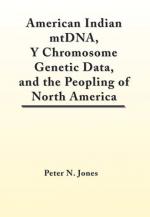|
This section contains 1,117 words (approx. 4 pages at 300 words per page) |

|
The diploid human genome is packaged within 46 chromosomes, as two pairs of 23 discrete elements, into all cells other than the haploid gametic egg and sperm cells. During the reproductive process, each parent's gametes contribute 22 nonsex chromosomes and either one X or one Y chromosome.
Paternal Inheritance
The X and Y chromosomes are the sex chromosomes for mammals, including humans. Not only are the X and Y sex chromosomes in mammals physically distinctive, with the Y being smaller, the Y chromosome is exceptionally peculiar. The X chromosome contains considerably more genes than the Y, which has its functionality essentially limited to traits associated with being male. It is the Y chromosome that carries the major masculinity-determining gene (SRY, for sex-determining region Y), which dictates maleness. In a mating pair, if the paternal partner contributes a normal Y chromosome, male gonadal tissues (testes) develop in the offspring. Only...
|
This section contains 1,117 words (approx. 4 pages at 300 words per page) |

|


